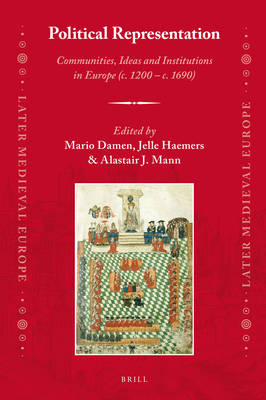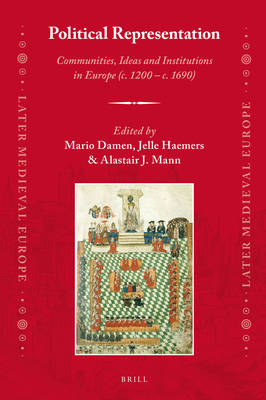
Door een staking bij bpost kan je online bestelling op dit moment iets langer onderweg zijn dan voorzien. Dringend iets nodig? Onze winkels ontvangen jou met open armen!
- Afhalen na 1 uur in een winkel met voorraad
- Gratis thuislevering in België vanaf € 30
- Ruim aanbod met 7 miljoen producten
Door een staking bij bpost kan je online bestelling op dit moment iets langer onderweg zijn dan voorzien. Dringend iets nodig? Onze winkels ontvangen jou met open armen!
- Afhalen na 1 uur in een winkel met voorraad
- Gratis thuislevering in België vanaf € 30
- Ruim aanbod met 7 miljoen producten
Zoeken
Political Representation: Communities, Ideas and Institutions in Europe (C. 1200 - C. 1690)
Damen Mario
€ 174,27
+ 348 punten
Omschrijving
Political Representation: Communities, Ideas and Institutions in Europe (c. 1200 - c. 1690), a scholarly collection on representation in medieval and early modern Europe, opens up the field of institutional and parliamentary history to new paradigms of representation across a wide geography and chronology - as testified by the volume's studies on assemblies ranging from Burgundy and Brabant to Ireland and Italy. The focus is on three areas: institutional developments of representative institutions in Western Europe; the composition of these institutions concerning interest groups and individual participants; and the ideological environment of representatives in time and space. By analysing the balance between bottom-up and top-down approaches to the functioning of institutions of representation; by studying the actors behind the representative institutions linking prosopographical research with changes in political dialogue; and by exploring the ideological world of representation, this volume makes a key contribution to the historiography of pre-modern government and political culture.
Contributors are María Asenjo-González, Wim Blockmans, Mario Damen, Coleman A. Dennehy, Jan Dumolyn, Marco Gentile, David Grummitt, Peter Hoppenbrouwers, Alastair J. Mann, Tim Neu, Ida Nijenhuis, Michael Penman, Graeme Small, Robert Stein and Marie Van Eeckenrode.
See inside the book.
Contributors are María Asenjo-González, Wim Blockmans, Mario Damen, Coleman A. Dennehy, Jan Dumolyn, Marco Gentile, David Grummitt, Peter Hoppenbrouwers, Alastair J. Mann, Tim Neu, Ida Nijenhuis, Michael Penman, Graeme Small, Robert Stein and Marie Van Eeckenrode.
See inside the book.
Specificaties
Betrokkenen
- Auteur(s):
- Uitgeverij:
Inhoud
- Aantal bladzijden:
- 348
- Taal:
- Engels
- Reeks:
- Reeksnummer:
- nr. 15
Eigenschappen
- Productcode (EAN):
- 9789004352414
- Verschijningsdatum:
- 27/09/2018
- Uitvoering:
- Hardcover
- Formaat:
- Genaaid
- Afmetingen:
- 160 mm x 236 mm
- Gewicht:
- 616 g

Alleen bij Standaard Boekhandel
+ 348 punten op je klantenkaart van Standaard Boekhandel
Beoordelingen
We publiceren alleen reviews die voldoen aan de voorwaarden voor reviews. Bekijk onze voorwaarden voor reviews.











